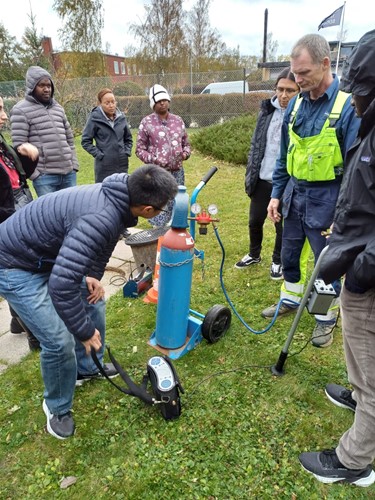News
Sharing innovative groundwater management practices done the Danish way

News
A recently concluded Danida Fellowship Centre programme has taught participants from nine countries the value of a data-driven approach to the governance of groundwater resources.
Groundwater is a major source of clean and potable water in many places, representing roughly a third of all freshwater sources available on the planet. As such, its proper administration is a matter of global interest. But groundwater management comes with a unique set of challenges that relevant institutions have varying capacities to deal with. In addition, the pressing needs of climate adaptation and sustainable use means more comprehensive solutions are required to address these challenges adequately.
This situation is at the forefront of a new learning programme offered by the Danida Fellowship Centre (DFC) – “Groundwater Governance, Management and Climate Adaptation” – which tackles the challenges to groundwater management with the use of modern and innovative strategies.
The DFC provides learning and capacity-building programmes for partner countries worldwide on behalf of the Danish Ministry of Foreign Affairs. NIRAS has been a major partner since 2008, developing and implementing a number of its courses, including this one on groundwater.
The current programme brought together professionals working in the water sector from nine countries—China, Colombia, Ethiopia, Ghana, India, Indonesia, Kenya, Morocco and South Africa—to teach best practices in groundwater management and help participants develop actionable strategies they could use with their own institutions towards facilitating sustainable use of groundwater resources.
In particular, the goals of the learning programme could be summed up as:
Apart from having access to e-learning resources and webinars, which comprised the first phase of the programme, participants spent three weeks in Denmark for face-to-face instruction, case-based learning and excursions to various offices and groundwater utility sites.

One of the key takeaways from the learning programme was the necessity of proper data management in order to create comprehensive strategies for managing groundwater resources. In particular, having a single central database containing all data regarding groundwater resources is crucial.
“When we talk about groundwater governance and management, simply, you cannot govern and manage without knowing what you have,” says Claes Clifford, programme leader and consultant at NIRAS. “In many countries, there is a lot of data, but it’s either in hard copy or on single computers somewhere, and it’s very difficult to have a complete, solid and comprehensive database where authorities can actually manage it properly.”
Denmark maintains one such database called Jupiter, which contains data on groundwater and drinking water resources in the country as well as other relevant environmental and geotechnical data. Jupiter is openly accessible to the public, and the DFC programme participants had the chance to study it as well.
“I was very impressed by the database,” said Chaymae El Hali, one of the participants. “It’s very rich, and we aim to have one like that in Morocco.”
“The data handling is excellent,” commented Suvedha, another participant from India. “They have more than 20 years of data, and from this data they are creating a model for groundwater management.”
DFC learning programmes provide hands-on knowledge and enable direct interventions through action plans. Participants are given the chance to formulate and propose an action plan, which they will develop over the course of the programme, and which will be implemented upon returning to their home countries. An action plan is tailored to the needs and capacities of each respective country.
Chaymae’s action plan involves improving the management of Morocco’s monitoring network for groundwater resources. “We do have a database, but we need to have data that is reliable, precise and coherent,” she said.
Another participant, Oudi Kgomongwe from South Africa, also shared her action plan, a groundwater management decision support tool called FIRST.
“This combines the various groundwater related databases that we have into one database, so we can go to one database to get a situational assessment of our groundwater challenges in various locations and areas across the country, as well as also give us a spatial overview so we can make those quick connections and insights before we delve deeper, so we can make those calls throughout the country and ensure water security remains top priority,” Oudi explained.
While the implementation of the participants’ action plans are their responsibility alongside their home organisations, through its learning programme managers and action plan mentors, DFC provides continued support. While the DFC course has ended, there is hope that these action plans will only be the first step for the participants to create change in their organisations, leading to better management of their countries’ groundwater resources in the long run.

Claes Clifford
International Technical Director Infrastructure (
København, Denmark

